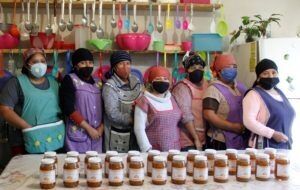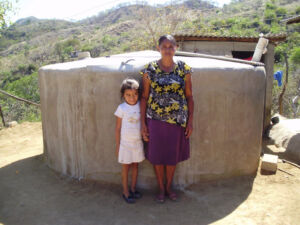During 2023, Alternare celebrated its 25th anniversary exceeding its own expectations by training campesinos from 18 indigenous communities and ejidos in the Monarch Butterfly Biosphere Reserve. One hundred thirty-five workshops with the participation of 1,141 people (9,910 women and 231 men) were held during the year, addressing topics such as participatory planning, climate change and reforestation, construction of fuel-efficient stoves, latrines, and cisterns, and production of organic fertilizers. Resulting from the workshops were 26 dry toilets (benefiting 26 families), seven cisterns (benefiting 75 families and 70 students and teachers), six fuel-efficient stoves and two community bread ovens (15 families benefiting). Additionally, 48 environmental education sessions were held in eight rural schools, some of the topics were: importance of the monarch butterfly, water management and forest conservation.

One of the most exciting projects that emerged this year was a pest and disease prevention program that Alternare is developing in collaboration with the Reserve. This project is closely linked to the ongoing research to improve community strategies to manage bark beetles in the MBBR.
Alternare is getting ready for the 2024 reforestation season. Read more here!
In 2022, Alternare's team benefited 296 families with the installation of 10 cisterns to capture rain water, 15 latrines, 6 water distribution systems and 2 fuel-efficient stoves.

In spite the challenges arising from the COVID-19 pandemic, the communities continued to promote conservation actions and adopt all the necessary precautionary measures to prevent the spread of the virus.

During 2021, a total of 79 workshops were held on different topics, in which 649 people (513 women and 136 men) from indigenous communities participated. Some of the topics taught were construction and management of cisterns, dry latrines, fuel-efficient stoves as well as backyard production (organic vegetables, animal care). People were also trained to make fruit and vegetable preserves to dispose of and/or sell surpluses. Likewise, in the preparation of medicinal plants, solid waste management, organic fertilizer, and forest tree production.
Among the results of some of these workshops were the construction of 10 cisterns to capture rainwater, 16 dry latrines and three fuel-efficient stoves. MBF and Alternare continue benefiting local communities while promoting forest conservation and reforestation in the overwintering habitat for the monarchs.
At the end of 2019 and early 2020, 37 men and 197 women from the MBBR’s indigenous communities participated in 29 workshops on several diverse topics such as: 1) Managing Solid waste properly, 2) Community savings & loans; 3) Care & management of backyard animals; 4) Fuel-efficient stove construction; 5) Organic vegetable production; 6) Limestone & soil floor construction. These workshops led to the construction of four stoves and two limestone floors.
Additionally, 244 girls and 204 boys in 18 schools participated in work sessions about the importance of water, soil, and the forest. Furthermore, five community regulations about water usage were drafted.

Despite the challenges of the Covid-19 pandemic, Alternare was able to conduct 41 conservation workshops during 2020! Topics included the production of organic fertilizer, vegetables, and forest trees, as well as solid waste management and the construction of fuel-efficient stoves, cisterns, and dry latrines. A total of 277 women and 36 men participated building 11 rainwater capturing cisterns, 12 fuel-efficient stoves and five latrines in 11 ejidos and six indigenous communities.

Additionally, 14 environmental education sessions about the importance of the monarch butterfly, taking care of the forest, soil, and water, were held in schools that Alternare works with before they closed due to the pandemic.

As they do every year, Alternare and the local communities started the year with meetings, workshops, and projects. Evaluation meetings were held to assess their 2018 activities and plan ahead for 2019. Encouraged by the results obtained during the past year, men and women heartily committed to continue working with Alternare. A total of 15 workshops on the production of organic vegetables, organic fertilizer, fruit, and forest trees were held, as well as on community savings and loans, construction of fuel-efficient stoves, and cisterns to capture rain-water. As a result, 20 fuel-efficient stoves and one cistern were built. Thirty school and four community tree nurseries in which 20,152 pines, oaks, alders, and ashes are growing continue being maintained. MBF applauds Alternare and the hard-working men and women who participate in all these activities!

Thanks to support from MBF during 2018, Alternare trained 105 people from the MBBR. Nineteen community cisterns were constructed for 93 families and another one was built for a school where 53 students will have access to rain water. Additionally, 2,537 people cultivated and nurtured 33,606 trees in 33 community and school nurseries.
To promote food security and improve living conditions, 545 people were trained to use agrological and ecological techniques in 67 workshops. These techniques include fuel-efficient stoves, organic vegetable production, dry latrines, and medicinal plants production.

A pilot project is currently underway to produce organic blackberries and blueberries! In partnership with other non-profit social enterprises, Alternare has set up greenhouses at their Training Center with the goal of eventually selling the produce locally and internationally. This will provide campesinos with the opportunity to become entrepreneurs and receive an income!
Additionally Alternare, celebrated their 20th anniversary with two exciting events! On January 27, 2018 in the training and demo center in Michoacán, held ‘community encounter’ with the indigenous communities and ejidos who live in and close to the monarch overwintering sites. During this event, attendees learned about the different programs that Alternare carries out in the MBBR. The event was an outstanding success with more than 400 people attending from the various communities .

Alternare and their team started 2017 facilitating thirty-nine workshops on diverse topics ranging from sustainable agricultural techniques such as organic farming, to recycling water and managing it sustainably. The workshops were held in ejidos and indigenous communities that own land in the Monarch Butterfly Biosphere Reserve. A total of 339 women and 140 men participated building five family fuel-efficient stoves, seven dry latrines, two community cisterns, two family cisterns, and two recycling bins for schools.
Since 68% of the Río San Juan Zitácuaro watershed spreads out over the Reserve, Alternare is working to improve water management and distribution among the communities. Currently, only 20% of the population has water in their household, the rest resort to placing hoses to extract water from the watershed. To solve this issue, Alternare has implemented five rural water distribution systems among four communities through the construction of cisterns, drafting community agreements and regulations for water use. As a campesino told us, “We used to place pipes to get water and used to argue over who was getting more water than the others but now with the agreements in place everything is more equal and fair.”

Training and community participation are at Alternare’s core and from June to October, 2016 a total of 17 workshops resulted in 74 fuel-efficient stoves, 2 community nurseries, 28 cisterns, and 4 dry latrines. This was an amazing accomplishment that empowered 184 women and 202 men from the indigenous communities of Crescencio Morales, Francisco Serrato, Carpinteros, Curungueo, Nicolas Romero and Manzanillo. Reforestation and tree planting techniques workshops were included and enabled communities to participate in our reforestation efforts. It is encouraging to witness the increasing number of participants. Just like the trees our collective efforts are also growing!

During 2014 and 2015 Alternare held loads of workshops and activities! Working with communities in the municipalities of Aporo, Angangueo, Irimbo, Ocampo, Jungapeo and Zitácuaro, they held 37 workshops with the participation of 261 women and 342 men. Workshop topics included forest and fruit tree planting and maintenance, organic fertilizer and vegetable production, soil conservation, computer software and entrepreneurship. These workshops resulted in the construction of six cisterns (four in the communities, two in schools), nine dry latrines (five in schools, four for families) as well as the establishment of two school tree nurseries. Cisterns enable communities to capture rain water for agricultural and personal use providing drinking water once it is boiled. In the words of Doña Leticia Carmona, from the San Francisco Serrato community, “Water used to be scarce and now we store it in the cistern and use it to irrigate the vegetables in our organic garden! It is wonderful, and we are very grateful!”

In 2013, 833 women 833 women and 480 men were taught to produce organic fertilizer, organic vegetables, forest and fruit trees, and adobe in 50 workshops. They also built dry latrines, cisterns, and fuel-efficient stoves. Other workshop topics included solid waste management, sustainable agriculture, water and soil conservation, and participatory community diagnostics, evaluation and planning. Their results were impressive; 15 cisterns, 61 fuel-efficient stoves, 14 dry latrines were completed along with 76 family vegetable gardens and one school tree nursery where 22,696 fruit and forest trees were retained for future reforestation.

In 2012 Alternare carried out 34 workshops to teach communities how to build adobe, fuel-efficient stoves, and cisterns, as well as techniques to produce organic fertilizer and forest trees. Participants enthusiastically embraced all the techniques learned and built a cistern for one community and another one for a school. The most exciting part was that after building 31 fuel-efficient stoves with funding provided by Alternare, more stoves were needed, and several communities raised funds on their own from the local and federal government to build 60 additional ones! More efficient stoves will decrease the need to use as many trees from the monarch wintering area, and provide more healthy cooking environments for local communities.

During 2011 and with support from MBF and other organizations Alternare was able to conduct eight workshops on forest tree production techniques and six on ways to improve tree planting from June to October. A total of 70 individuals (56 women, 14 men) participated in the former and 189 (70 women and 119 men) in the latter.


